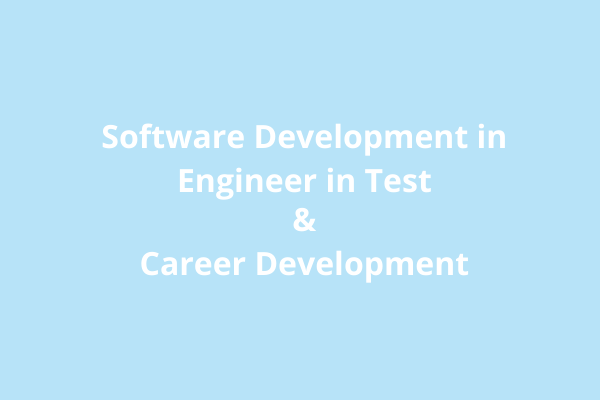Course Description

One – One instructor led online training and the objective is to advance the student in to a SDET (Software Development in Engineer in Test) and to build the student profile with comprehensive qualities as per the industry standard to secure a role as SDET.
Pre-Requisites of Joining SDET
Student is expected to know the QA process conceptually in terms of both manual and automation approaches and an introduction to any of the programming language is beneficial
Course Structure
Course is structured in line with the career progression level of a functional SDET and the course aims to taught and practice all these levels in an emulated real time environment in a hierarchical way as represented below.

SDET Course Syllabus
Level 1 – Language
- Programming language in-depth – Java
- Introduction to HTML, CSS, SQL
Level 2 – Front End Automation
- Web — Selenium Web Driver, Junit, TESTNG, Builder, POM, Cucumber BDD, Allure
- Mobile — Appium, Espresso
- Desktop — UFT
Level 3 – Backend Automation:
- Understanding Micro Services Architecture
- Manual API Testing – RESTFUL – POSTMAN
- Automated API Testing - Rest Assured, Java Spring, Lombok, Guice, Karate, GraphQL
Level 4 – DevOps Automation:
- Code & Build — Git, Bitbucket, Maven, Docker
- Release & Configure — Jenkins, Kubernetes
Level 5 – Cloud Automation:
- AWS Services — EC2, Lambda
- Azure DevOps
SDET Course Trajectory
In Depth Programming Language
Basics of HTML and CSS and Java. After getting accustomed to the language’s basics and standards, we move on to its advanced level (libraries and frameworks).
UI, API, Mobile, Desktop - Automation
With advanced programming knowledge under the belt coming to automation tools and technologies, we pick up open-source, popular automation tool that builds up the profile of the student as well helps them to perform automation at the UI layer and the API layer. At present, for this course, UI automation is done using Selenium Web Driver, the libraries which have useful APIs and good community support are Junit, TESTNG, Cucumber BDD and Allure. Here we aim to create an automation framework from scratch using Builder and POM as design patterns and learn the core techniques of UI automation like locating elements using different locating strategies and performing actions. For Mobile UI automation integrate Appium into the same framework
For API automation, learn the fundamentals of API Testing involving, REST, GraphQL and tools such as Rest Assured, Java Spring, Lombok, Guice and Karate
SCM/VC
Once learned how to automate things using various automation tools, we learn a version control system (preferably Git). As an SDET, you will be writing, managing, reviewing, and modifying a lot of source code. Parallelly, Student opens a GitHub account, create public repositories in it, and push the automation side-projects to showcase the automation, coding and framework designing skills to the world.
Design Patterns and Principles
With all the necessary tools and technologies in toolkit now, we extend the learning to create frameworks, learn about Design Patterns like POM (Page Object Model, Singleton, Builder in parallel. Also, we study about the Clean Coding practices, Coding Standards, techniques to write high-quality code from various resources.
CI, Service Virtualization, Cloud and Containerization
Practicing integrating the created frameworks into Jenkins/AZURE DEVOPS and run the tests. Finally, we learn about Containerization and Service Virtualization using Wiremock and Docker, Kubernetes.
Placement Activities
Personalized Interview Guidelines and CV Preparation of Industry standards.
Still Undecided About Joining The Career Centre?
Book a Demo Class Now & Decide for Yourself.
SDET Course Schedule
| Week | Topic | Learning |
| Week 1 | Java in Depth | Working with Instructor with extensive exercises |
| Week 2 | Java in Depth | Working with Instructor with extensive exercises |
| Week 3 | Functional Automation Refresh | Working with Builder and POM Design patterns |
| Week 4 | Mobile UI Automation | Working with Appium, Introduction to Espresso |
| Week 5 | Desktop Automation and API automation | Introduction to UFT and Working with API automation tech stack |
| Week 6 | Deployment tools and cloud Automation | Working with GIT, Docker, Jenkins and Introduction to AWS and Azure DevOPS |
| Week 7 | Comprehensive Refresh of the Stack | Working to build a complete automation pack |
| Week 8 | Extensive Interview Preparation | Personalized Interview Guidelines for SDET |

